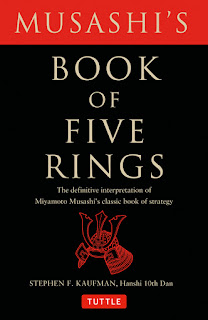Title: The Art of War
Written by: Sun Tzu
Interpreted by: Stephen F. Kaufman
Publisher: Tuttle Publishing
Format: Softcover
Cover Price: $12.95 (US)
AND
Title: Book of Five Rings
Written by: Miyamoto Musashi
Interpreted by: Stephen F. Kaufman
Publisher: Tuttle Publishing
Format: Softcover
Cover Price: $13.95 (US)
This is a little different type of review today. First, I'm going to be reviewing two books at the same time. Secondly, I'm not going to review the books themselves, but rather these particular versions of them. The Art of War and Book of Five Rings are classic books that I believe everyone reading this has heard of, and probably read themselves. However, each version that I have read (I own three different versions of each now) interprets them a little different. Its fun to go through them and see how they take the same material and translate them differently.
Both books have been claimed by the business community since the 80's as insightful books on how to conduct deals and corporate takeovers, but that wasn't their original purpose. I can see why they are used that way, but I don't see them really being able to work with that intension. They are books about conquering enemies and ruling people, not management and buyouts. Business and war are very different aspects of humanity. Both deal with conflict, true, but in very different ways. That's why Kaufman Hanshi has gone beyond the simple idea of translating the books, and instead works as interpreter, speaking specifically to the martial artists out there. What's funny is his introduction goes through and talks about how the Way of business and the Way of the sword are not the same, and how this version of the book is intended to be for, what he terms martialists, and then the back cover of the book, where it gives the category, says "business."
Pros
Kaufman Hanshi really does a good job of taking both titles out of the poetic, esoteric type of writing into something more concrete. He does keep some of the embellishing terms used throughout both books, but makes sure they make sense. He also does a really good job of making sure everything is geared towards a martial reader. This could be a martial artist, or a military officer, but they are both going to get something more out of this version than the others that are translated for a businessman.Cons
Anytime translation or interpretation is done, there will be some drift from the original text for interpretation's sake. If you go in with that knowledge, then everything is fine. However, there are some writings in Book of Five Rings that I haven't been able to find in other versions. They still fit in exactly with the intent of the book, and indeed even explain things better than other versions I've read, but its still going outside the original author. Just a picky point with me.Conclusion
It is always hard to translate ancient foreign language texts into modern English. There are manyterms and ideas that we don't have equivalent words for. That being said, I really like both interpretations of these books. I think that martial artists would do well do what I did, and take these texts along with other translations, and compare and contrast them. I think when you do that, you get a much fuller, and complete version of what the original authors were trying to convey.
With all of that said, I'm going to give Kaufman Hanshi's interpretations of these two classics 4.5 out of 5 Ninja Stars, as they are very well done, and specific to the martialist audience that is reading them. I just don't know if any one version of these books gets the full meaning into it. But to be honest, these are the closest I've seen that gets the right intention across.



The 'Art of War' is the theoretical basis for some careers in marketing academia.
ReplyDelete